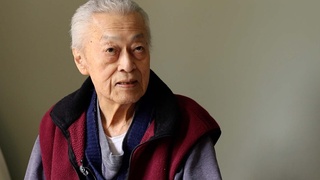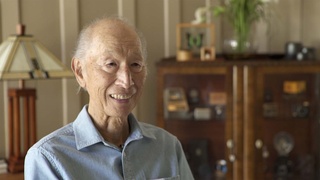Interviews
Strictly American, but sympathize with Japan
It’s like a father and mother fighting, you know like - I know my folks, they weren’t anti-America, they loved the United States, they loved Japan too, they loved both country and to be fighting, it was the worst thing that could possibly happen even to me. I said, gosh in a way, when Japan was being successful, going down, I said hey, good. They’re successful, they’re show…you know, a powerful nation, you know.
But, it’s one of those ambivalent feeling here, gee…[laughs] You love both countries, but you have to choose between one side. Well, naturally I’m an American, so you know, I’m strictly American but I sympathized with Japan’s position, there even. I think there was, what was that, reverend at the last minute, he was trying to prevent this war…I forgot, there were a lot of Americans, were trying to prevent the war, they understood Japan’s position, you know.
And if I had a white face, I probably would have been called to Washington to become a semi-expert on Japan and, but being with this face, automatically you become pro-Japanese you know.
Date: March 25, 2005
Location: California, US
Interviewer: Sojin Kim
Contributed by: Watase Media Arts Center, Japanese American National Museum
Explore More Videos

FBI agents came to the house while parents were gone
(b. 1923) Japanese American poet, activist

Mother was ordered to speak English during FBI house search
(b. 1923) Japanese American poet, activist

School held emergency drills at the start of World War II
(1934–2018) Japanese American designer, educator, and pioneer of media technologies

Father lost everything during World War II
(1934–2018) Japanese American designer, educator, and pioneer of media technologies

His family Traveled to Japan in 1940
(b. 1938) Japanese American. Hiroshima atomic bomb survivor

His Memory of August 6, 1945
(b. 1938) Japanese American. Hiroshima atomic bomb survivor

Escape from Hiroshima
(b. 1938) Japanese American. Hiroshima atomic bomb survivor

Returning to Hiroshima in ruins
(b. 1938) Japanese American. Hiroshima atomic bomb survivor

Overcoming trauma and speaking about his A-Bomb experience
(b. 1938) Japanese American. Hiroshima atomic bomb survivor

Family having to hide guns during World War II in Colombia
(b.1974) Japanese Colombian who currently resides in the United States

Japanese were treated with dignity during WWII (Spanish)
(b.1974) Japanese Colombian who currently resides in the United States

Enjoying undokai and sports in Crystal City
(b. 1936) Japanese Peruvian incarcerated in Crystal City

Kids activities in Crystal City
(b. 1938) Japanese Peruvian incarcerated in Crystal City

Having nowhere to go postwar
(b. 1938) Japanese Peruvian incarcerated in Crystal City

Finding family’s barrack on map of Crystal City
(b. 1942) Japanese Peruvian incarcerated in Crystal City
